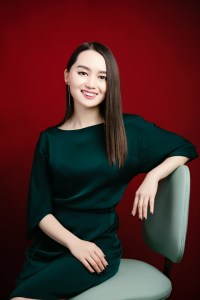

By ANGELA JIE WANG, MARGOT LAMBILLIOTTE, MARIA RINCON, NATALIE MEYER and NICO GOUS
She likes spicy food, drinks hot water, and can eat rice three times a day. “Yes, I am 100% made in China,” she readily acknowledged during her talk at TEDxYouth@Suzhou conference in November 2017.
So what makes Peng different? She likes to entertain strangers in bars after work as a part-time stand-up comedian.
“Once my friend said, ‘Really, Sarah? After work you voluntarily and routinely go to [a] bar to entertain some strangers for free?’ I said [it’s] not always free, sometimes you have to pay 50RMB. ‘What?’ my friend said. ‘You even pay the audience to watch your show?!”
Her uncertainty of her second career stands in stark contrast to the reliability of her day job. A law teacher in Suzhou, Peng is one of the few Chinese women doing stand-up comedy in English.
Peng said in her TEDx talk that law school taught her how to think like a lawyer, but comedy made her think like a comedian. She believes this has made her more open-minded and shown her how to laugh when life gets her down.
“I think we don’t have to get married before 30. We don’t have to have kids at a certain age. And, we do not have to live a life like others,” Peng said. “There should be many possibilities and choices in life and I want to define my own happiness and success and way of living. When I watch stand-up comedy with people, when we are laughing together, for that special moment, we all experience the same emotions.”
Peng was not a fan of stand-up comedy while growing up. In fact, she watched her first stand-up comedy show only in 2013.
“I had never seen that (comedy) before. It was really interesting,” Peng said in an interview. “After that, I started to watch more and more shows. All of them were in English. There are almost no [comedy] shows in Chinese yet.”
From spectator to headliner, Peng started performing in 2014 studying comedy for about a year. Her first performance was in a restaurant in Suzhou. She wrote all her jokes on a piece of paper.
“I arrived half an hour early. Within that half an hour I went to the bathroom three times,” Peng said. “My brain was blank and my hands were sweating. And I asked myself, ’why do I torture myself like this?’”
Peng told herself she would do it once and never again. Then the host called her name.
“I don’t remember how I walked to the stage,” Peng said. “After the show I told myself, ‘Wow, I survived!’ It’s amazing to see people laugh because of my jokes, and said ’maybe I should try it again.’”
Originally from Hunan province, Peng is a teaching fellow at the International Business School Suzhou (IBSS) of Xi’an Jiaotong-Liverpool University (XJTLU), the largest international joint venture university in China.
Peng obtained bachelor degrees in law and economics from the Minzu University of China (Beijing). She also holds a master’s degree in law from a joint program between Tsinghua University (Beijing) and Temple University (Philadelphia, U.S.), and a master’s in management from the University of Liverpool in the U.K.
Peng said being a Chinese female comedian has been challenging in a field dominated by men. Most English stand-up comedians in China are foreigners.
Peng says it is hard being a full-time English language stand-up comedian in China. Stand-up comedy in China is less than 10 years old. The industry is in its infancy compared to the U.S. She is also the founder of the Suzhou Comedy Club in Suzhou.
“I have had struggles in terms of the language barrier. I also tried to translate some of my English jokes into Chinese, but it just didn’t work,” Peng said.
Peng has been speaking English for over two decades. Doing comedy in English has enabled her to perform in the U.S. and Singapore. In the future, Peng hopes to share her stand-up comedy globally.
“I would like to travel around the world. If I tell jokes in Chinese, it’s difficult for me in the future to go abroad,” Peng said.





